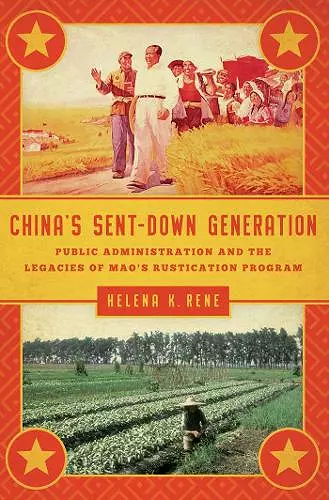China's Sent-Down Generation
Public Administration and the Legacies of Mao's Rustication Program
Format:Paperback
Publisher:Georgetown University Press
Published:29th Mar '13
Currently unavailable, and unfortunately no date known when it will be back

Rene convincingly demonstrates that China's sent-down program of the late 1960s and 1970s is best understood as the capstone of the Cultural Revolution. This is the definitive study of the administrative organization and implementation of the rustication policy from the headquarters in the capital to the countryside and of the experiences of the youths who survived it. The book will be of great value to those interested in post-1949 China and large-scale public administrative systems and operations. -- Hon Chan, professor, department of public and social administration, City University of Hong Kong This is one of the most fascinating and insightful pieces I have read in public administration in the last few years. The book clearly shows the relevancy of public administration to the Chinese rustication policy and it is the first of its kind to examine a major policy of the Cultural Revolution through the lenses of public administration and policy. The author provides an excellent overview of the politics surrounding the Cultural Revolution and its concomitant policies. Also it represents a very thorough and cogent application of the Weberian framework to Mao's efforts to transform China to a communist society and also to his efforts to enforce communism through his Cultural Revolution. This book should be required reading for all public administration students. -- Norma Riccucci, professor, Rutgers University, Newark This extraordinary book provides provocative insights and new understandings based on the author's first-hand field interviews. The originality of data, together with its underlying normative concerns, makes it a valuable addition to the existing literature on public administration and bureaucratic politics as well as Chinese studies. -- Ting Gong, professor of public and social administration, City University, Hong Kong
During China's Cultural Revolution, Chairman Mao Zedong's "rustication program" resettled seventeen million urban youths, known as "sent downs," to the countryside for manual labor and socialist reeducation. This book examines the mechanisms and dynamics of state craft in China, from the rustication program's inception to its termination.During China's Cultural Revolution, Chairman Mao Zedong's "rustication program" resettled 17 million urban youths, known as "sent downs," to the countryside for manual labor and socialist reeducation. This book, the most comprehensive study of the program to be published in either English or Chinese to date, examines the mechanisms and dynamics of state craft in China, from the rustication program's inception in 1968 to its official termination in 1980 and actual completion in the 1990s. Rustication, in the ideology of Mao's peasant-based revolution, formed a critical component of the Cultural Revolution's larger attack on bureaucrats, capitalists, the intelligentsia, and "degenerative" urban life. This book assesses the program's origins, development, organization, implementation, performance, and public administrative consequences. It was the defining experience for many Chinese born between 1949 and 1962, and many of China's contemporary leaders went through the rustication program. The author explains the lasting impact of the rustication program on China's contemporary administrative culture, for example, showing how and why bureaucracy persisted and even grew stronger during the wrenching chaos of the Cultural Revolution. She also focuses on the special difficulties female sent-downs faced in terms of work, pressures to marry local peasants, and sexual harassment, predation, and violence. The author's parents were both sent downs, and she was able to interview over fifty former sent downs from around the country, something never previously accomplished. China's Sent-Down Generation demonstrates the rustication program's profound long-term consequences for China's bureaucracy, for the spread of corruption, and for the families traumatized by this authoritarian social experiment. The book will appeal to academics, graduate and undergraduate students in public administration and China studies programs, and individuals who are interested in China's Cultural Revolution era.
Made a great contribution to our understanding of Maoist Cultural Revolution and why its attempt to build a socialist society ultimately did not work. China Review International Any social issues collection strong in Chinese experience will find this an important revealing analysis-the best in print to date. Choice A rare and detailed piece of scholarship into the management of a core part of the 1968-1978 Chinese Cultural Revolution ... While the political context in the book has since passed, aspects of the portrayed decision-making style of the leadership still persist today. Pacific Affairs A detailed, in-depth analysis of Mao's program ... and is a 'must' for any collection strong in Chinese history and social development ... a key acquisition for any who would understand the impact of Mao on present-day China. Midwest Book Review
- Winner of Chadwick Alger Prize (United States).
ISBN: 9781589019874
Dimensions: unknown
Weight: 386g
240 pages